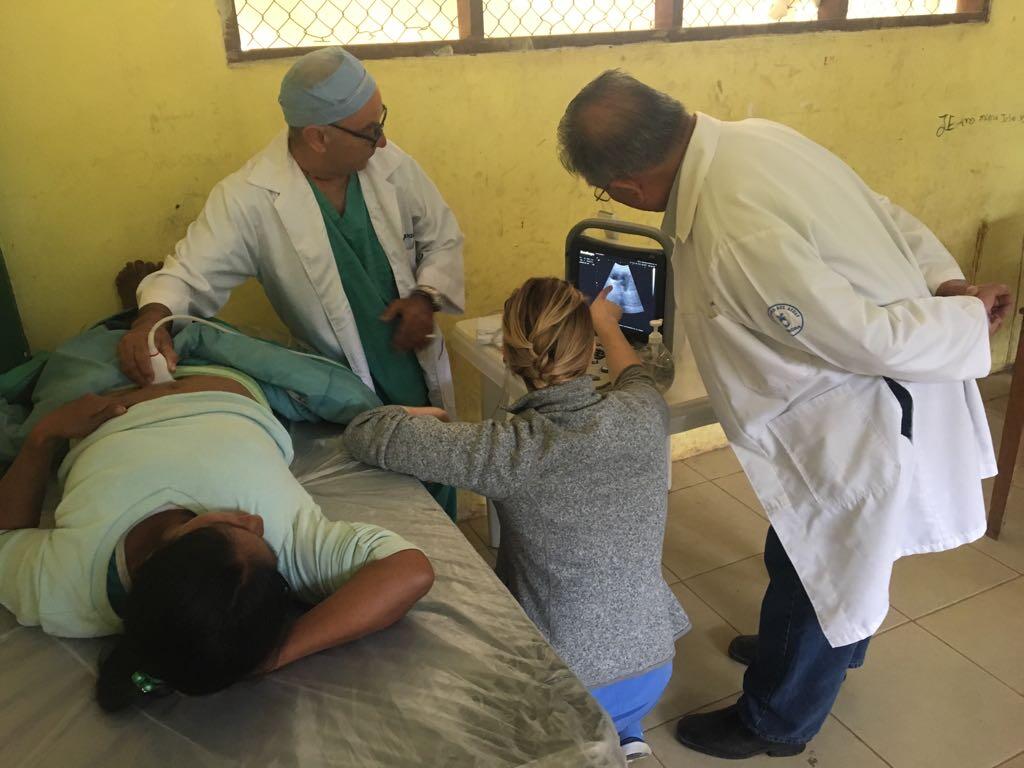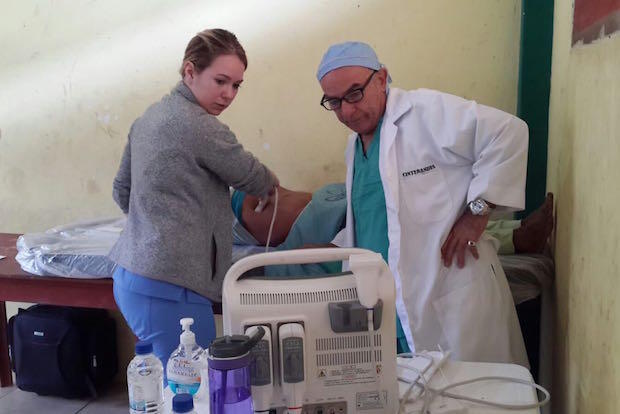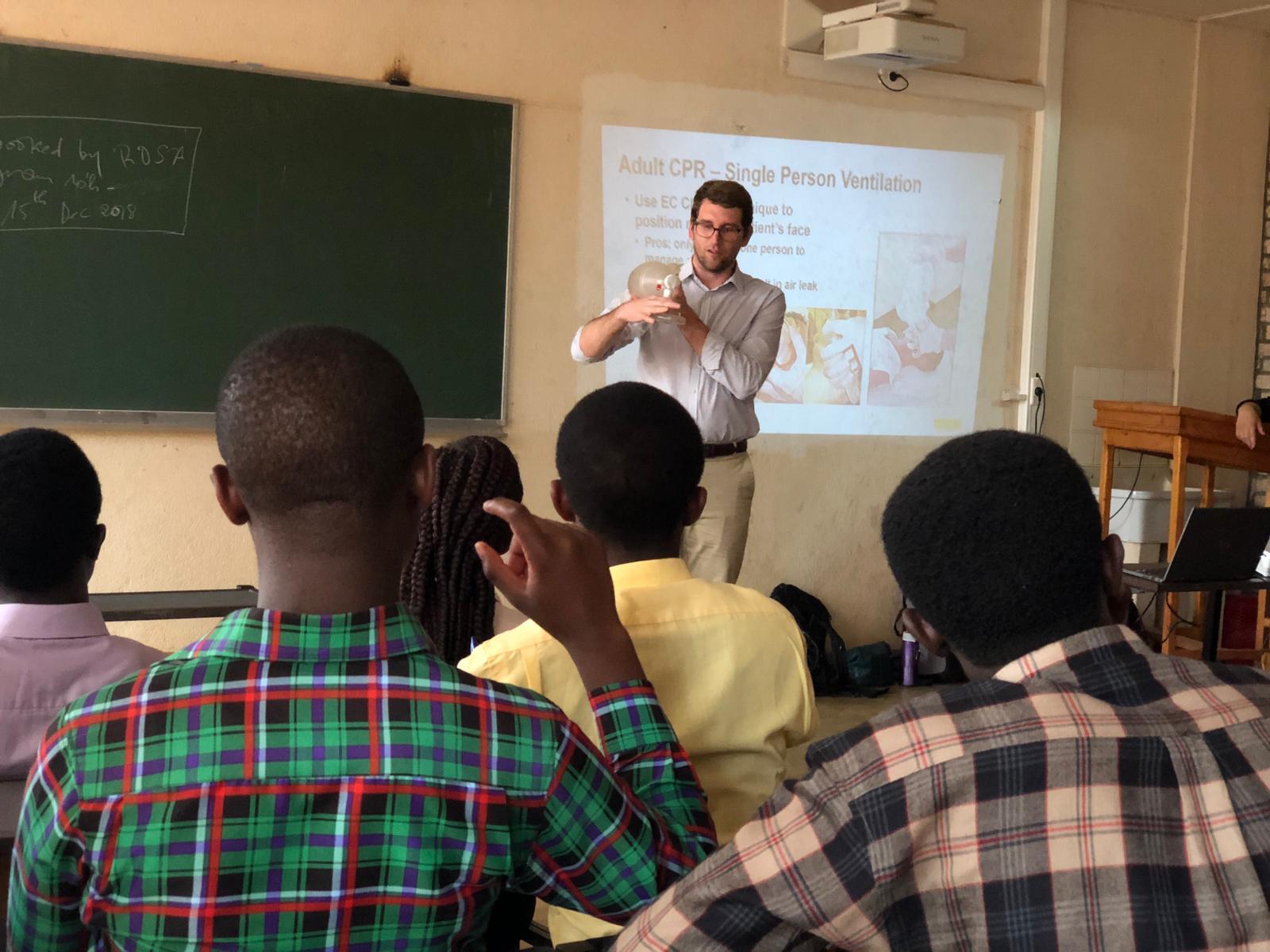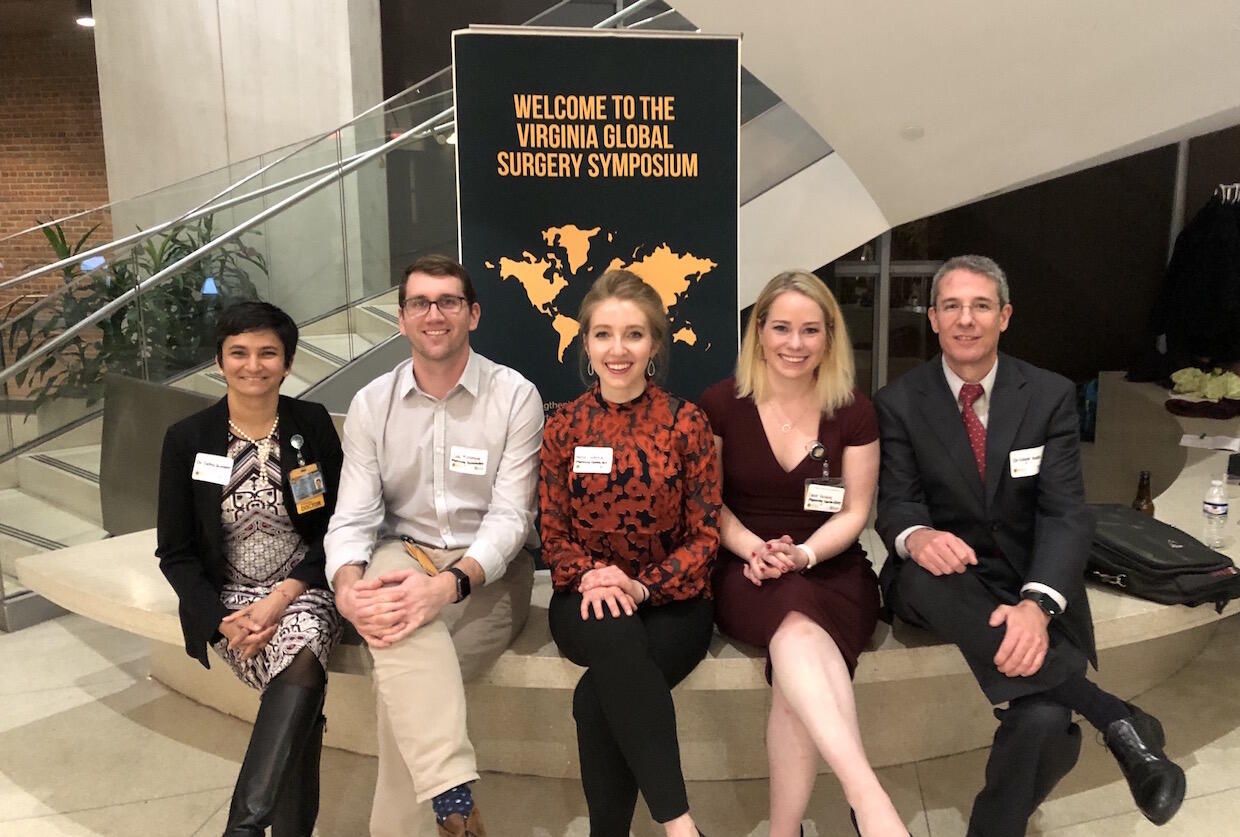
May 6, 2019
‘Fighting for human rights’: Students prep for careers in global surgery
Share this story
Catherine “Cassie” Valukas speaks only basic Haitian Creole, the French-based language of Haiti. But on a medical mission trip to the island nation, she used the limited vocabulary she knew to comfort and care for a pregnant Haitian woman who had life-threatening preeclampsia.
The closest hospital with a neonatal intensive care unit was four hours from the clinic in Arcahaie, Haiti, where Valukas was spending six months volunteering before starting medical school at Virginia Commonwealth University. It wasn’t safe to drive to the hospital in the dark, so Valukas and her roommate, a fourth-year medical student, did the next best thing for their patient: They took her to their house for the night. Together, they provided round-the-clock lifesaving medical attention until the woman could be transported to the hospital the next morning. She later gave birth to premature twins, who are doing well.
Valukas, now a fourth-year student in the VCU School of Medicine, has traveled the world to provide medical assistance in low- and middle-income countries like Haiti. The need is great: According to the Lancet Commission on Global Surgery, 5 billion people in the world lack access to safe surgical and anesthetic care. Surgery is an indispensable part of health care, yet surgical care has been a low priority in the world’s poorest regions. Delays in seeking, reaching and receiving surgical care mean that many treatable conditions become fatal.
About 143 million procedures are needed every year to prevent disability and save lives, the commission reports. Today’s surgical workforce needs to double in 15 years to address that need.
VCU School of Medicine students Merve Gurakar and Cody McHargue share Valukas’ passion for providing surgical care in low- and middle-income countries. Each of these future physicians is a Global Surgery Research Scholar in the VCU Program for Global Surgery. The three are mentored by associate professors of surgery Sudha Jayaraman, M.D., and Edgar Rodas, M.D., the program’s co-directors.
“They are smart, thoughtful, hardworking folks,” Jayaraman said. “They have a tremendous amount of skill and knowledge to offer.”
In March, with their mentors’ support, the students brought the 2019 Virginia Global Surgery Symposium to VCU.
The global surgery movement is more than just humanitarian missions to underserved countries, Rodas said. Global surgery teams create awareness of the need for surgical care, conduct site and needs assessments, build surgical and medical capacity, educate the public about health issues, and conduct meaningful research that will bring positive change. Working with local and government officials, they study and address the systems that create barriers to surgical care.
At VCU, the Program for Global Surgery offers medical students and residents an opportunity to conduct vital research in low- and middle-income countries to answer a clinical or process-oriented question. The results are published and presented at conferences.
Valukas, Gurakar and McHargue each have considerable experience working in low- and middle-income countries, most recently under the direction of Jayaraman and Rodas. These future global surgeons already have made significant contributions to the field.

Health is a human right
Valukas was a political science major at the University of Iowa, anticipating a career in human rights law in developing countries, when a scheduling mix-up put her on a different path. She was studying abroad in South Africa her junior year when she was erroneously placed in a clinic internship.
She had no experience in medicine, but working in the clinic clicked for her.
“I realized that I loved being in a clinical atmosphere,” Valukas said. “I liked the intersection of science and working with people. There is a person-to-person aspect of medicine, but you're also thinking deeply about the kind of problem you have to solve.”
With a new career focus, Valukas took the required classes to apply to medical school. Other medical mission trips abroad — to Namibia, South Africa, India, Honduras and Ecuador — have underscored her commitment.
“Whatever I was going to do in life, it was going to involve some aspect of fighting for human rights,” Valukas said. “And I think health is a very important one.”
On her first trip to Haiti, she got a “reality check” about the social determinants of health — conditions where people live, learn, work and play that affect a wide range of health risks and outcomes. The combination of inadequate housing, limited or no access to hospitals, and unsanitary living conditions put most people living there at risk of major infectious diseases.
Shadowing a physician, Valukas visited a cervical cancer patient in her remote home composed of mud and metal sheeting. The woman had come to the previous clinic, at which time doctors found tumors blocking her urinary tract. Checking on her three months later, Valukas and the doctor discovered the woman had developed a life-threatening infection at her catheter site.
“She was in tremendous pain, both from the infection and the cancer, and all we could give her was ibuprofen,” Valukas said. “Narcotics are illegal in Haiti. The doctor tried to explain to her family that no matter what we did today, even if she didn’t die of infection, she was still going to die of cancer.”
The visit left an indelible impression on Valukas.
“I think you cannot truly be an effective clinician or public health worker if you don’t understand that health is not solely the result of a disease process on the body, and it doesn’t begin or end with a visit to the doctor,” she said. “While post-operative infections can occur anywhere, this woman’s inability to access follow-up treatment for her infection or screening services to diagnose her cervical cancer were the result of social determinants of health.”
At VCU, Valukas continued to seek out opportunities. Following her first year of medical school, she worked with underserved, rural populations in Honduras with Humanitarian Outreach Medical Brigada Relief Effort, a nonprofit providing direct training for medical students and residents with faculty experienced in global health. After her third year of medical school, she went to Ecuador with Cinterandes, an Ecuadorian mobile surgical program. Working closely with Rodas, Valukas traveled to a remote area of the country and provided post-operative care following outpatient surgeries.
She also worked with Jayaraman on developing sustainable pre-hospital trauma care systems in Rwanda. Jayaraman has a grant from the National Institutes of Health to work with the Ministry of Health to improve Rwanda’s trauma and emergency systems.
“Surgery is a system,” Valukas said, “and ultimately you need all parts of that system working together to effect sustainable change. If you are considering a career in global health or global surgery, this is something to keep in mind.”
Valukas will do her residency training in general surgery at McGaw Medical Center of Northwestern University in Chicago. She plans to focus her career on strengthening surgical systems in surgically underserved communities both in the U.S. and in low- and middle-income countries.
There is a person-to-person aspect of medicine, but you're also thinking deeply about the kind of problem you have to solve.
‘The power of human connectivity’
A fourth-year student in the School of Medicine, Gurakar grew up in a family of doctors. Her father is a hepatologist, as was her grandfather. Gurakar’s family is from Turkey, where her grandfather practiced medicine and her father attended medical school.
A psychology major at Princeton University, she minored in global health and health policy, envisioning a career in medicine. Between her freshman and sophomore years, she volunteered at a primary care clinic in Gaziantep, Turkey. Gurakar coordinated the clinic’s newborn immunization program.
“That was really a great experience, because I was seeing all the basic things like hypertension and diabetes care management happening in the clinic,” she said. “But then I also got to go out into the surrounding neighborhoods with the nurse who worked at the clinic and find mothers who had not yet brought in their newborns for their vaccinations.”
Gurakar was struck by what she calls “the power of human connectivity.”
“We'd knock on the door of these apartments, and the kids would be peering out at us from the top floor,” she said. “The mothers would let us in and offer us tea. We got to talk to them about how the baby was doing and give them their newborn immunization card, deliver any immunizations they needed, and invite them back to the clinic for a full evaluation. What really motivates me to pursue global health is these intimate relationships that you form with people and getting to see them in their natural environments, which is very different from the hospital setting.”
Between her junior and senior years of college, Gurakar was a clinical assistant and translator at the Kilis Oncupinar Accommodation Facility, a refugee camp in Kilis, Turkey, for refugees fleeing the Syrian civil war. Gurakar, who is fluent in Turkish and knows conversational Arabic, worked in the emergency health ward, administering first aid to some of the 14,000 refugees living in the camp. She elicited their basic histories in Arabic and translated them into Turkish for the clinicians.
“We saw everything from common colds to minor cuts and injuries,” she said. “I was jumping in to help where I could. I really enjoyed being able to comfort them.”
In 2018, Gurakar put her Spanish language skills to use on a medical mission trip to Ecuador with Cinterandes. In her first week, in the city of Cuenca, she examined post-operative outcomes of hernia repair surgeries performed by Cinterandes from 2013-17, concluding that hernia repair can be safely performed in a mobile surgery unit with low complication rates comparable to hospital-based surgery. In the second week, in the rural coastal town of Palmar, she often worked past midnight leading post-operative recovery and management efforts, and ensuring patients met hourly post-operative goals.
She witnessed another example of “the human connection” as the Ecuadorians helped each other through pre-surgery jitters.
“Before they go into surgery, all the patients are supporting each other, sitting outside under the palm trees,” she said. “A family member brings in mangoes for the whole team, and then everyone is sitting outside eating mangoes. It's just a very comfortable and intimate form of health care delivery. This excites me and motivates me to work in these underserved settings.”
Gurakar, who earned a master of public health with a concentration in epidemiologic and biostatistical methods for public health and clinical research at Johns Hopkins Bloomberg School of Public Health, will do her residency training in internal medicine at Johns Hopkins Hospital. Her interest is in building capacity for gastroenterologic care in low- and middle-income countries.
“I would love to lead a global digestive disease center one day, and form a network of clinicians and researchers to provide a very specific service that’s lacking in many areas,” she said.

‘Why am I so lucky?’
McHargue’s father is a firefighter and his mother is a social worker. “That calling to help others, I got from them,” said McHargue, a third-year student in the School of Medicine.
McHargue majored in psychology at the University of California at Santa Barbara and minored in global peace and securities. Interested in a career in global health care but not sure in what role, he spent three weeks in Honduras with the school’s chapter of Global Medical Brigades, an international movement of students and medical professionals working alongside local communities to implement sustainable health systems in areas with limited or no access to health care. McHargue helped raise funds for and organize the trip, and recruit physicians. The day after he graduated, he went to Ghana with Global Medical Brigades to help staff a clinic.
McHargue spent almost a month in the African nation, using his EMT certification to triage more than 1,000 patients. He also shadowed doctors, handed out medications and educated the public about malaria, a serious and sometimes fatal mosquito-borne disease prevalent on the continent.
“I came away thinking this is what I want to do. These are the people I want to help,” McHargue said. “I walked out of there saying, why am I so lucky that I can just go to a doctor whenever I want? People in low- and middle-income countries should have access to the same health care as me.”
Last winter, McHargue spent a month in Kigali, Rwanda, working through VCU's collaboration to make the capital city’s ambulance system, Service d'Aide Medicale Urgente, more efficient. The Rwandan Ministry of Health created SAMU in 2007.
Previous to McHargue’s visit, other research scholars from VCU had collected and analyzed cases from SAMU. They identified six common emergencies, such as traumatic brain injury and respiratory distress, that would benefit from standardized care and a mechanism to track the care the ambulance staff provide. McHargue implemented these forms, which included information such as patient vitals, why the ambulance was called, physical exam findings and the interventions provided, tailored to ensure high-quality care for the six most common emergencies.
Analyzing the preliminary data, McHargue is helping track how well each of the six emergencies is being treated in the pre-hospital (ambulance) setting.
“If we don’t track the quality of care, we can’t improve it,” said Jayaraman, who has supervised McHargue on the project.
McHargue aspires to continue developing emergency and trauma systems in low- and middle-income countries using his experience in Rwanda. He plans to pursue a general surgery residency and continue working in global surgery.

‘It set the bar high’
In March, VCU hosted the first Virginia Global Surgery Symposium, sponsored by Global Surgery Student Alliance.
Independent of each other, McHargue, who founded VCU’s GSSA chapter, and Valukas were in talks with the organization to bring its third national conference to Richmond. Gurakar, co-founder with Rodas and Jayaraman of a monthly global surgery seminar series highlighting the VCU faculty’s international involvements, joined the effort soon after.
The symposium served as an international platform to raise awareness of the surgical disparities that exist. It brought together faculty, residents and students from across specialties to highlight current efforts in low- and middle-income countries, foster discussion and encourage collaboration.
“This conference was about showing examples of surgeons and clinicians who have incorporated global surgery into their lives, who have made this work a part of their life mission,” Gurakar said.
“It was both a platform for students to learn about global surgery and how to get involved,” Valukas said. “But it was also a way for us to highlight VCU faculty and students who are doing all this wonderful work. It also showed mid-career physicians how they might become global surgeons or how residents can get involved.”
The first of its kind in the Mid-Atlantic region, the sold-out conference attracted 250 medical students, residents and mid-career physicians from across the U.S. and abroad.
“It was an incredible symposium,” Jayaraman said. “It set the bar high and exposed VCU’s strengths to a much broader audience. It was a tremendous opportunity to showcase VCU.”
VCU has a history of sending medical teams abroad and working internationally to improve public health systems and patient outcomes. For several decades, VCU surgeons representing specialties including plastic surgery, pediatrics, urology, neurosurgery, general surgery and trauma have worked across numerous countries to consult, teach and support the development of other surgeons, trainees and students to deliver the best care possible in their settings.
“The symposium reminded people that VCU has been a global player and that we’ve been doing this for a long time,” Rodas said. “This was a chance to really demonstrate the institutional values and commitment that have been longstanding.”
It was also a chance to let Valukas, Gurakar and McHargue shine.
“I’m very impressed by their leadership skills, their organization and how they conducted themselves professionally,” Rodas said. “We’re building future leaders. They’re going to be superstars.”
Subscribe to VCU News
Subscribe to VCU News at newsletter.vcu.edu and receive a selection of stories, videos, photos, news clips and event listings in your inbox.







